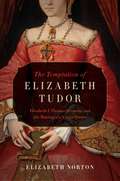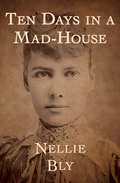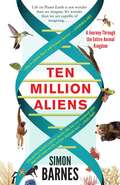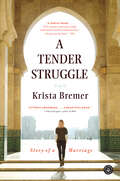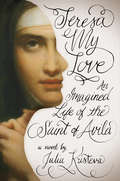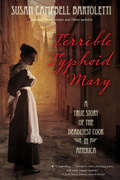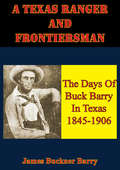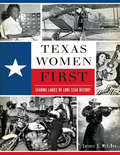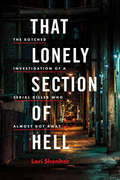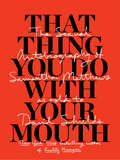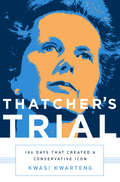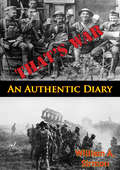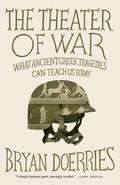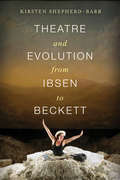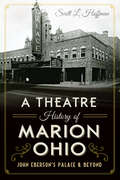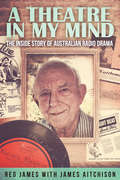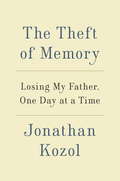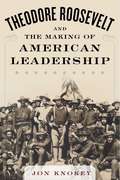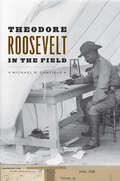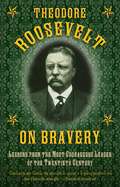- Table View
- List View
The Temptation of Elizabeth Tudor: Elizabeth I, Thomas Seymour, and the Making of a Virgin Queen (Great Lives Ser.)
by Elizabeth NortonA power-hungry and charming courtier. An impressionable and trusting princess. The Tudor court in the wake of Henry VIII’s death had never been more perilous for the young Elizabeth, where rumors had the power to determine her fate England, late 1547. King Henry VIII Is dead. His fourteen-year-old daughter Elizabeth is living with the king’s widow, Catherine Parr, and her new husband, Thomas Seymour. Seymour is the brother of Henry VIII’s third wife, the late Jane Seymour, who was the mother to the now-ailing boy King. Ambitious and dangerous, Seymour begins and overt flirtation with Elizabeth that ends with Catherine sending her away. When Catherine dies a year later and Seymour is arrested for treason soon after, a scandal explodes. Alone and in dreadful danger, Elizabeth is threatened by supporters of her half-sister, Mary, who wishes to see England return to Catholicism. She is also closely questioned by the king’s regency council due to her place in the line of succession. Was she still a virgin? Was there a child? Had she promised to marry Seymour? Under pressure, Elizabeth shows the shrewdness and spirit she would later be famous for. She survives the scandal, but Thomas Seymour is not so lucky. The “Seymour Scandal” led Elizabeth and her advisers to create of the persona of the Virgin Queen. On hearing of Seymour’s beheading, Elizabeth observed, “This day died a man of much wit, and very little judgment.” His fate remained with her. She would never allow her heart to rule her head again.
Ten Days in a Mad-House: Large Print
by Nellie BlySoon to be a major motion picture: A courageous female journalist's classic exposé of the horrific treatment of the mentally ill in nineteenth-century America In 1887, Nellie Bly accepted an assignment from publisher Joseph Pulitzer of the New York World and went undercover at the lunatic asylum on Blackwell Island, America's first municipal mental hospital. Calling herself "Nellie Brown," she was able to convince policemen, a judge, and a series of doctors of her madness with a few well-practiced facial expressions of derangement. At the institution, Bly discovered the stuff of nightmares. Mentally ill patients were fed rotten, inedible food; violently abused by a brutal, uncaring staff; and misdiagnosed, mistreated, or generally ignored by the doctors and so-called mental health experts entrusted with their care. To her horror, Bly encountered sane patients who had been committed on the barest of pretenses and came to the shocking realization that, while the Blackwell Island asylum was remarkably easy to get into, it was nearly impossible to leave. This ebook has been professionally proofread to ensure accuracy and readability on all devices.
Ten Million Aliens: A Journey Through the Entire Animal Kingdom
by Simon BarnesFor Discovery Channel enthusiasts, this scientific foray into life on planet earth examines how the world&’s creatures--both weird and wonderful--are inextricably linked.Life on planet earth is not weirder than we imagine. It’s weirder than we are capable of imagining. And we’re all in it together: humans, blue whales, rats, birds of paradise, ridiculous numbers of beetles, molluscs the size of a bus, the sexual gladiators of slugs, bdelloid rotifers who haven’t had sex for millions of years and creatures called water bears: you can boil them, freeze them and fire them off into space without killing them.We’re all part of the animal kingdom, appearing in what Darwin called “endless forms most beautiful and most wonderful." In this breathtakingly audacious book, Simon Barnes has brought us all together, seeking not what separates us but what unites us. He takes us white-water rafting through the entire animal kingdom in a book that brings in deep layers of arcane knowledge, the works of Darwin and James Joyce, Barnes’s own don’t-try-this-at-home adventures in the wild, David Attenborough and Sherlock Holmes. Ten Million Aliens opens your eyes to the real marvels of the planet we live on.
A Tender Struggle: Story of a Marriage
by Krista Bremer“A story about love, marriage, compromise, parenthood and the difference between the life one imagined and reality.”* Fifteen years ago, Krista Bremer, a California-bred feminist, surfer, and aspiring journalist, met Ismail Suayah, sincere, passionate, kind, yet from a very different world. One of eight siblings born in an impoverished fishing village in Libya, Ismail was raised a Muslim--and his faith informed his life. When Krista and Ismail made the decision to become a family, she embarked on a journey she never could have imagined, an accidental jihad: a quest for spiritual and intellectual growth that would open her mind and, more important, her heart. “A bold piece of writing (and thinking) by an incredibly brave woman.” —Elizabeth Gilbert, author of The Signature of All Things “A moving, lyrical memoir.”—Kirkus Reviews “Candid and rich.” —Good Housekeeping “Unrelenting candor and gorgeous prose.” —BookPage “Krista Bremer has a very good story.” —The New York Times Book Review “A beautiful account of [Krista’s] jihad, or struggle, to find peace within herself and within her marriage.” —The Kansas City Star “Lucid, heartfelt, and profoundly humane . . . Navigates the boundaries of religion and politics to arrive at the universal experience of love.” —G. Willow Wilson, author of Alif the Unseen “This is a memoir worth reading.” —*Pittsburgh Post-Gazette
Teresa, My Love: An Imagined Life of the Saint of Avila (To The Point)
by Julia KristevaMixing fiction, history, psychoanalysis, and personal fantasy, Teresa, My Love turns a past world into a modern marvel, following Sylvia Leclercq, a French psychoanalyst, academic, and incurable insomniac, as she falls for the sixteenth-century Saint Teresa of Avila and becomes consumed with charting her life. Traveling to Spain, Leclercq, Julia Kristeva's probing alter ego, visits the sites and embodiments of the famous mystic and awakens to her own desire for faith, connection, and rebellion. One of Kristeva's most passionate and transporting works, Teresa, My Love interchanges biography, autobiography, analysis, dramatic dialogue, musical scores, and images of paintings and sculpture to engage the reader in Leclercq's—and Kristeva's—journey. Born in 1515, Teresa of Avila outwitted the Spanish Inquisition and was a key reformer of the Carmelite Order. Her experience of ecstasy, which she intimately described in her writings, released her from her body and led to a complete realization of her consciousness, a state Kristeva explores in relation to present-day political failures, religious fundamentalism, and cultural malaise. Incorporating notes from her own psychoanalytic practice, as well as literary and philosophical references, Kristeva builds a fascinating dual diagnosis of contemporary society and the individual psyche while sharing unprecedented insights into her own character.
Teresa, My Love: An Imagined Life of the Saint of Avila
by Kristeva Julia. Translated by Lorna Scott Fox.In the vein of A. S. Byatt's Possession, a scholar immerses herself in a quest to reconstruct the life of an ecstatic saint, turning a past world into a modern marvel.
Terrible Typhoid Mary: A True Story of the Deadliest Cook in America
by Susan Campbell BartolettiWhat happens when a person's reputation has been forever damaged? With archival photographs and text among other primary sources, this riveting biography of Mary Mallon by the Sibert medalist and Newbery Honor winner Susan Bartoletti looks beyond the tabloid scandal of Mary's controversial life. How she was treated by medical and legal officials reveals a lesser-known story of human and constitutional rights, entangled with the science of pathology and enduring questions about who Mary Mallon really was. How did her name become synonymous with deadly disease? And who is really responsible for the lasting legacy of Typhoid Mary? This thorough exploration includes an author's note, timeline, annotated source notes, and bibliography.
A Texas Ranger And Frontiersman: The Days Of Buck Barry In Texas 1845-1906
by James Buckner Barry"Although Jim Bowie and Davy Crockett were more celebrated, Buck Barry did as much or more to tame the Old Southwest. During a long and useful life he was a professional soldier, stock farmer, sheriff, and member of the legislature. His memoirs are never dull, and no wonder. In 1845 young James Buckner Barry joined the newly formed Texas Rangers and for the next twenty years his life was one of unremitting activity and danger. These pages show him fighting outlaws and Indians from the Red River to the Rio Grande. He served in the Mexican and Civil wars, coming out as a lieutenant colonel. Then he confronted the daily perils of ranching in Bosque County, Texas. Peace officer, legislator, "he served his people well even to the neglect of his private advantage." Such is the tribute of the historian James K. Greer, who edited Buck Barry's private papers and reminiscences and shaped them into this book."-Print ed.
Texas Women First: Leading Ladies of Lone Star History
by Sherrie S. McleroyAmerican history is teeming with unconventional, trailblazing Lone Star women with big, unprecedented achievements--outstanding, outrageous, outré women who know all about being "Texas Big" and being first. Texas's own Bessie Coleman was the first black person in the world to earn a pilot's license. Students and typists the world over breathed a sigh of relief when San Antonio-born Bette Nesmith Graham released Mistake Out, now known as Liquid Paper®. Way ahead of the curve, University of Texas graduate Aida Nydia Barrera saw the need for bilingual educational programming and in 1970 started Carrascolendas, the first television show of its kind in the country. In 1981, El Paso's Sandra Day O'Connor became the first female justice of the United States Supreme Court. Join author Sherrie McLeRoy for an introduction to the exceptional women of Lone Star history.
That Lonely Section of Hell
by Lori ShenherFrom her first assignment in 1998 to explore an increase in the number of missing women to the harrowing 2002 interrogation of convicted serial killer Robert Pickton, Lori Shenher tells a story of massive police failure-failure of the police to use the information about Pickton available to them, failure to understand the dark world of drug addiction and sex work, and failure to save more women from their killer.Shenher explains how police unwillingness to believe the women were missing or murdered, jurisdictional squabbles, and a fear of tunnel vision conspired to leave women unprotected and vulnerable to a serial killer nearly three years after she first received a tip that Pickton could be responsible. She unflinchingly reveals her own pain and psychological distress as a result of these events, which left her unable to work with or trust the police and the criminal justice system. That Lonely Section of Hell reveals the deeper truths behind the causes of this tragedy and the myriad ways the system-and society-failed to protect vulnerable people.
That Thing You Do With Your Mouth
by Samantha Matthews David ShieldsIn That Thing You Do With Your Mouth, actress and voice-over artist Samantha Matthews offers-in the form of an extended monologue, prompted and arranged by New York Times bestselling author (and Matthews's cousin once removed) David Shields-a vivid investigation of her startling sexual history. From her abuse at the hands of a family member to her present-day life in Barcelona, where she briefly moonlighted as a dubber of Italian pornography into English, Matthews reveals herself to be a darkly funny, deeply contemporary woman with a keen awareness of how her body has been routinely hijacked, and how she has been "formatted" by her early trauma. Her story is a study of her uneasy relationships with female desire, her tormentors, and her lovers-with whom she seeks out both the infliction and receipt of harm. This book is an attempt, sometimes self-thwarted, to break down barriers: sexual and emotional for Matthews, literary for Shields.For them, the only response to the unspeakable is to speak, to do that thing you do with your mouth, as directly and honestly as possible. Their provocative performance refuses neat resolution or emotional pornography; it will have readers, from literary critics to Jezebel commentators, raving, raging, celebrating, talking.
Thatcher's Trial: 180 Days That Created A Conservative Icon
by Kwasi KwartengIn 1981, Margaret Thatcher faced the greatest challenge of her premiership. After nearly two years in office, the British economy was in a bad condition; unemployment had reached levels not seen since the 1930s; the public finances were in the worst condition since 1945. The Economist memorably describes her on 21st March, 1981: "Mrs Thatcher is emerging from her second year of office as one of the most extraordinary leaders in modern politics. Her country is in deep recession. Her Cabinet is not so much divided as bewildered. Her once adoring backbenchers are either mutinous or glum. And she has speaking out against her almost every traditional Tory interest: private industry, the City, the counties, the universities, the senior civil service, the 'defence' establishment. . . . "Yet she seems impervious to it all. . . . " She faced a resurgent social democratic liberalism, and by common consent had just a few months to save her premiership. Instead, in less than 180 days, she reinvented conservatism, showed a ruthless willingness to cut the traditionalists from her government, and promoted a new technocratic generation of fervent right-wingers who would be devoted to her until her final days. Thatcher's Trial is a short focused history, an investigation of a slice in time. It is also a study in the nature of personality and the ability of individuals to shape events in politics and history. Its narrative is largely drawn from newspapers, archival material from both the Churchill Archive at Churchill College, Cambridge, where Margaret Thatcher's papers have been deposited, and at the National Archive. The memoirs of Thatcher's contemporaries such as Nigel Lawson, Norman Tebbit, Michael Heseltine and others also form an invaluable resource of primary material for this incisive history. Thatcher's Trial shows how, in a dazzlingly short time, Thatcher transformed the Conservative Party from one that belonged to Westminster, The Guards and Whites Club, to an utterly unrecognizable institution that opened conservatism to the masses.
That’s War: An Authentic Diary
by William A. SirmonThat's War is a diary of the authentic experiences of Lt. William Arthur Sirmon from January 1, 1918 to November 12, 1918. In this account of a regular officer in the 82nd Division, 325th Infantry, you are led through ten chapters of a heartfelt, attention-grabbing journey. It starts out at Ft. Gordon, Georgia, where Sirmon was in charge of training soldiers. His story takes you across the beautiful, yet run down, terrain of France.William Arthur Sirmon spent more than four years prior to 1917 as an officer of the Philippine Constabulary, serving primarily in Mindanao, the "Island of Blood". He was the most highly decorated soldier from Georgia, and it is believed, of the entire Great War. February 16th, 1919, only he and Sergeant Alvin York were awarded The Legion of Honor of France, Distinguished Service Cross and the Croix de Guerre with Palm by General Pershing. These accolades made him an honorary citizen of England and France.This diary is not completely blood and guts, but surprisingly light for the most part. It describes the day-to-day life of typical American doughboys and the obstacles they faced through the entire war. That's War is a great read filled with excitement and humor, with education and entertainment throughout.--Print Ed.
The Theater of War: What Ancient Greek Tragedies Can Teach Us Today
by Bryan DoerriesThis is the personal and deeply passionate story of a life devoted to reclaiming the timeless power of an ancient artistic tradition to comfort the afflicted. For years, theater director Bryan Doerries has led an innovative public health project that produces ancient tragedies for current and returned soldiers, addicts, tornado and hurricane survivors, and a wide range of other at-risk people in society. Drawing on these extraordinary firsthand experiences, Doerries clearly and powerfully illustrates the redemptive and therapeutic potential of this classical, timeless art: how, for example, Ajax can help soldiers and their loved ones better understand and grapple with PTSD, or how Prometheus Bound provides new insights into the modern penal system. These plays are revivified not just in how Doerries applies them to communal problems of today, but in the way he translates them himself from the ancient Greek, deftly and expertly rendering enduring truths in contemporary and striking English. The originality and generosity of Doerries's work is startling, and The Theater of War--wholly unsentimental, but intensely felt and emotionally engaging--is a humane, knowledgeable, and accessible book that will both inspire and enlighten. Tracing a path that links the personal to the artistic to the social and back again, Doerries shows us how suffering and healing are part of a timeless process in which dialogue and empathy are inextricably linked.From the Hardcover edition.
Theatre and Evolution from Ibsen to Beckett
by Shepherd-Barr KirstenReveals the deep, transformative entanglement among science, art, and culture in modern times
A Theatre History of Marion, Ohio: John Eberson's Palace And Beyond (Landmarks)
by Scott L. HoffmanOne of the last remaining atmospheric theatres in the nation, elegant Marion Palace Theatre holds a storied history behind its curtains. From the "Wigwam," the Grand Opera House and Germania Park Pavilion to nickelodeons, vaudeville houses and movie theatres, performance has been an essential part of Marion's history, and the Palace is the city's jewel. Designed by renowned theatre architect John Eberson, the Palace opened its doors in 1928 to packed audiences of over three thousand patrons. Author Scott L. Hoffman delves into the life and work of John Eberson and the forgotten stories of the Palace that include a police gambling raid, the construction of the theatre and the stars who performed for dazzled audiences there.
A Theatre in my Mind
by James Aitchison Reg JamesRadio drama is often called the "theatre of the mind", wherein a listener's imagination is stimulated by voices, sounds, and music to create mental imagery as real as any bricks-and-mortar theatre. Reg James spent a lifetime in the thick of Australian radio drama. Rising through the ranks at Grace Gibson Radio Productions -- from despatch boy to general manager -- he takes us behind the scenes into the fascinating world of broadcasting from the 1930s to the present day. The great shows, the magic voices, the pure drama of putting shows to air -- Reg shares his secrets and stories in this amazing journey back in time to a lost era. With co-author James Aitchison, Reg invites you to join him in this unique theatre. Essential reading for anyone who enjoyed listening to radio serials, and for those fascinated by Australian radio. Authors of Yes, Miss Gibson, the biography of Grace Gibson.
Thecla
by Domenico AgassoIn Thecla: A Prophetic Voice in Media Evangelization, enter the fascinating world of Venerable Thecla Merlo, cofoundress of the Daughters of St. Paul. She believed that women could be actively associated with the preaching apostolate through the "Good Press." This lively, intelligent woman used her uncommon gifts to become a prophetic voice for evangelization. Thecla was moved by one intention: "To do good" by spreading the Gospel. Published on the centenary celebration of the Daughters of St. Paul.
The Theft of Memory
by Jonathan KozolNational Book Award winner Jonathan Kozol is best known for his fifty years of work among our nation's poorest and most vulnerable children. Now, in the most personal book of his career, he tells the story of his father's life and work as a nationally noted specialist in disorders of the brain and his astonishing ability, at the onset of Alzheimer's disease, to explain the causes of his sickness and then to narrate, step-by-step, his slow descent into dementia. Dr. Harry Kozol was born in Boston in 1906. Classically trained at Harvard and Johns Hopkins, he was an unusually intuitive clinician with a special gift for diagnosing interwoven elements of neurological and psychiatric illnesses in highly complicated and creative people. "One of the most intense relationships of his career," his son recalls, "was with Eugene O'Neill, who moved to Boston in the last years of his life so my father could examine him and talk with him almost every day." At a later stage in his career, he evaluated criminal defendants including Patricia Hearst and the Boston Strangler, Albert H. DeSalvo, who described to him in detail what was going through his mind while he was killing thirteen women. But The Theft of Memory is not primarily about a doctor's public life. The heart of the book lies in the bond between a father and his son and the ways that bond intensified even as Harry's verbal skills and cogency progressively abandoned him. "Somehow," the author says, "all those hours that we spent trying to fathom something that he wanted to express, or summon up a vivid piece of seemingly lost memory that still brought a smile to his eyes, left me with a deeper sense of intimate connection with my father than I'd ever felt before." Lyrical and stirring, The Theft of Memory is at once a tender tribute to a father from his son and a richly colored portrait of a devoted doctor who lived more than a century.From the Hardcover edition.
The Theft of Memory: Losing My Father, One Day at a Time
by Jonathan KozolNational Book Award winner Jonathan Kozol is best known for his fifty years of work among our nation's poorest and most vulnerable children. Now, in the most personal book of his career, he tells the story of his father's life and work as a nationally noted specialist in disorders of the brain and his astonishing ability, at the onset of Alzheimer's disease, to explain the causes of his sickness and then to narrate, step-by-step, his slow descent into dementia. Dr. Harry Kozol was born in Boston in 1906. Classically trained at Harvard and Johns Hopkins, he was an unusually intuitive clinician with a special gift for diagnosing interwoven elements of neurological and psychiatric illnesses in highly complicated and creative people. "One of the most intense relationships of his career," his son recalls, "was with Eugene O'Neill, who moved to Boston in the last years of his life so my father could examine him and talk with him almost every day." At a later stage in his career, he evaluated criminal defendants including Patricia Hearst and the Boston Strangler, Albert H. DeSalvo, who described to him in detail what was going through his mind while he was killing thirteen women. But The Theft of Memory is not primarily about a doctor's public life. The heart of the book lies in the bond between a father and his son and the ways that bond intensified even as Harry's verbal skills and cogency progressively abandoned him. "Somehow," the author says, "all those hours that we spent trying to fathom something that he wanted to express, or summon up a vivid piece of seemingly lost memory that still brought a smile to his eyes, left me with a deeper sense of intimate connection with my father than I'd ever felt before." Lyrical and stirring, The Theft of Memory is at once a tender tribute to a father from his son and a richly colored portrait of a devoted doctor who lived more than a century.From the Hardcover edition.
Theodore Roosevelt and the Making of American Leadership: Never Hit Softly
by Jon KnokeyThe epic story of how one man shaped events, people, and himself to forever change a country. President Theodore Roosevelt forever transformed America, ushering the country into the arena of world supremacy. His brand of leadership is entirely American: confident, compassionate, energetic, diverse, visionary. But Roosevelt was not a born leader; his ascent to the apex of power was not a foregone conclusion. He made himself a leader of consequence and it is his epic journey to the White House--a road filled with terrific failures, intimate introspection, and self-made luck--will inspire readers anew. While a graduate student at Harvard, author Jon Knokey, a Roosevelt historian and business leader, unearthed hundreds of unpublished letters and interview notes from Roosevelt contemporaries. These long-forgotten documents provide a fresh and stunning ringside seat along the 26th President’s journey to 1600 Pennsylvania Avenue. The stories from Harvard chaps, idealistic political reformers, coarse cowboys from the Badlands, and rough and tumble Rough Riders from the nation’s interior, all combine to illuminate the maturation process of a man learning to lead at every stage of his life. Fast paced and written as a biographical narrative, Theodore Roosevelt and the Making of American Leadership places the reader alongside a young Theodore Roosevelt as he learns what he stands for and how he will lead. Skyhorse Publishing, as well as our Arcade imprint, are proud to publish a broad range of books for readers interested in history--books about World War II, the Third Reich, Hitler and his henchmen, the JFK assassination, conspiracies, the American Civil War, the American Revolution, gladiators, Vikings, ancient Rome, medieval times, the old West, and much more. While not every title we publish becomes a New York Times bestseller or a national bestseller, we are committed to books on subjects that are sometimes overlooked and to authors whose work might not otherwise find a home.
Theodore Roosevelt in the Field
by Michael R. CanfieldNever has there been a president less content to sit still behind a desk than Theodore Roosevelt. When we picture him, he's on horseback or standing at a cliff's edge or dressed for safari. And Roosevelt was more than just an adventurer--he was also a naturalist and campaigner for conservation. His love of the outdoor world began at an early age and was driven by a need not to simply observe nature but to be actively involved in the outdoors--to be in the field. As Michael R. Canfield reveals in Theodore Roosevelt in the Field, throughout his life Roosevelt consistently took to the field as a naturalist, hunter, writer, soldier, and conservationist, and it is in the field where his passion for science and nature, his belief in the manly, "strenuous life," and his drive for empire all came together. Drawing extensively on Roosevelt's field notebooks, diaries, and letters, Canfield takes readers into the field on adventures alongside him. From Roosevelt's early childhood observations of ants to his notes on ornithology as a teenager, Canfield shows how Roosevelt's quest for knowledge coincided with his interest in the outdoors. We later travel to the Badlands, after the deaths of Roosevelt's wife and mother, to understand his embrace of the rugged freedom of the ranch lifestyle and the Western wilderness. Finally, Canfield takes us to Africa and South America as we consider Roosevelt's travels and writings after his presidency. Throughout, we see how the seemingly contradictory aspects of Roosevelt's biography as a hunter and a naturalist are actually complementary traits of a man eager to directly understand and experience the environment around him. As our connection to the natural world seems to be more tenuous, Theodore Roosevelt in the Field offers the chance to reinvigorate our enjoyment of nature alongside one of history's most bold and restlessly curious figures.
Theodore Roosevelt on Bravery: Lessons from the Most Courageous Leader of the Twentieth Century
by Theodore RooseveltTeddy Roosevelt is the only president in history to deliver a ninety-minute speech directly after being shot in the chest. He’s a Nobel Prize recipient, a Harvard graduate, and he was the youngest President in history to be inaugurated into office. Roosevelt’s force took America by storm in the early twentieth century, and he is regarded as one of the finest leaders ever to take office. His wisdom even earned him a spot in Mount Rushmore, which has immortalized him along with George Washington, Thomas Jefferson, and Abraham Lincoln. As a sickly child, Roosevelt was home-schooled his entire life until enrolling at Harvard University, where he studied biology. A year after graduating, he began his political career as the New York City police commissioner, and later as a member of the New York State Assembly, where he led the reform division of the GOP. In the time since his presidency, Roosevelt’s bravery has inspired generations of Americans. "A man who is good enough to shed his blood for the country is good enough to be given a square deal afterwards. ” Skyhorse Publishing, as well as our Arcade imprint, are proud to publish a broad range of books for readers interested in history--books about World War II, the Third Reich, Hitler and his henchmen, the JFK assassination, conspiracies, the American Civil War, the American Revolution, gladiators, Vikings, ancient Rome, medieval times, the old West, and much more. While not every title we publish becomes a New York Times bestseller or a national bestseller, we are committed to books on subjects that are sometimes overlooked and to authors whose work might not otherwise find a home.
Theodore the Great: Conservative Crusader
by Daniel RuddyTheodore Roosevelt has a complicated legacy. To some, he was the quintessential American patriot and hero, a valiant soldier who won the Congressional Medal of Honor. Others remember him as a cultural icon, the man who brandished a "big Stick," proclaimed the "Square Deal," led a "Strenuous Life," and inspired the "Teddy Bear." He was a farsighted conservationist who essentially founded the modern environmental movement. He was also a legendary hunter. Mark Twain once called him "insane." <P><P>So who was the real Teddy Roosevelt? <P><P>Daniel Ruddy’s new biography cuts through the impenetrable tangle of misconceptions and contradictions that have grown up over the last century and obscured our view of a man who remains perhaps the most controversial president in U.S. history. Avoiding the sins of hero worship and character assassination, Ruddy gives the public what is long overdue—a fair-minded and even-handed assessment of a misunderstood American icon.
The Theology of Augustine’s Confessions
by Paul RigbyThis study of the Confessions engages with contemporary philosophers and psychologists antagonistic to religion and demonstrates the enduring value of Augustine's journey for those struggling with theistic incredulity and religious narcissism. Paul Rigby draws on current Augustinian scholarship and the works of Paul Ricœur to cross-examine Augustine's testimony. This analysis reveals the sophistication of Augustine's confessional text, which anticipates the analytical mindset of his critics. Augustine presents a coherent, defensible response to three age-old problems: free will and grace; goodness, innocent suffering, and radical evil; and freedom and predestination. The Theology of Augustine's Confessions moves beyond commentary and allows present-day readers to understand the Confessions as its original readers experienced it, bridging the divide introduced by Kant, Hegel, Freud, Nietzsche, Heidegger, and their descendants.
